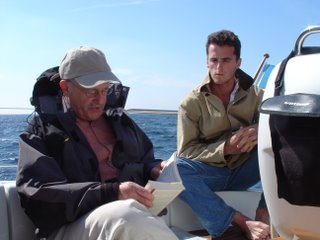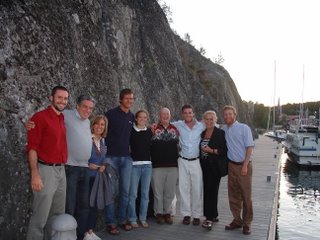June 15, 2006
Ship’s Log
June 15, 2006
Departure Location: Rödhamn, Äland Islands
Departure Time: 10:00 hours
Distance Travelled: Rödhamn to Mariehamn (Mothers Haven) 11.49 Nautical Miles, Mariehamn to Kastelholms Slott 14.96 Nautical Miles
Arrival Location: Kastelholms Slott (Castle Island)
Arrival Time: 18:30 hours
Weather: Clear, cold, winds from the north
Personal Comments
Stopped at Mariehamn for supplies. As we approached Kastelholms Slott white swans began to appear on the bay. This was a fine portent for our upcoming exploration because the white swan was Apollo’s sacred bird and we were approaching the sea of Apollo. On our itinerary the sea of Apollo corresponds with Delet, which, in Vinci’s theory, is the same word as Delos, meaning bright or radiant, and is the Bright Island in the poem “The Sailing of the Homer” (found on the website). Upon arrival we explored the port and found an old-fashioned farmstead being restored to its original condition. Everything from the windmills to the central castle was being redone and the effect was beautiful. We took many wonderful pictures.
Research Comments:
Some scholars have posited that the Trojan War only took one year. Today we discussed what some of the motivations for war could have been if this theory were indeed true. In the Homeric text the Trojan war is described as lasting ten years, but many scholars believe that this time range is more a convention of storytelling than a reflection of the actual passage of time (to read Vinci’s thoughts on the length of the war see pg. 146 and 147 in his text).. In the Homeric texts Helen of Troy is given as the central reason for going to war, but we discussed other possible motivations that could have existed for a conflict of this size. It seems unlikely that Helen served as enough of a catalyst for such an extensive war, and also strange that she would be named as the only reason for the war.
Three of the major alternative ideas that were discussed were a) the Achaeans wanting to expand their empire, b) the need, rather than the desire, for acquiring resources due to a climatic downturn, or c) that Troy represented a gateway to the east which needed to be breached in order to access all of the things that were available in, or beyond, Priam’s lands. It is also true that while any of these explanations may individually have been causes for the war, it is also possible that it may have been one or more of these reasons simultaneously.
Whether or not any of these theories are true, they are interesting to consider and change the way that the Homeric texts can be read as a historical document.



0 Comments:
Post a Comment
<< Home